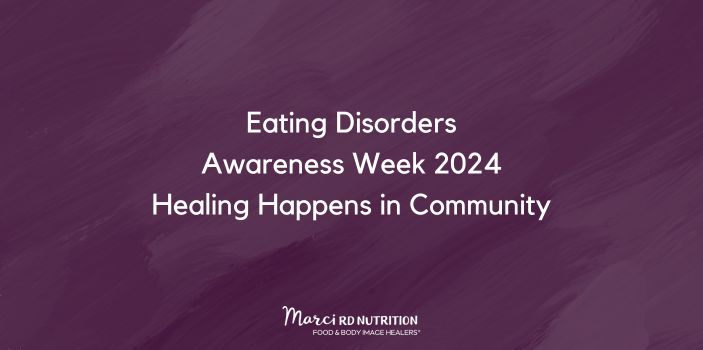Today marks the first day of Eating Disorders Awareness Week (EDAW) with this year’s theme, “Healing in Community.”
Historically, during eating disorders (ED) awareness week, I’ve aimed my efforts at clinicians outside the ED profession. This year, I’m taking a different approach and speaking directly to those of us already treating EDs, because in order for healing to happen (and it does!), we have to remain committed to cleaning up shop. When we do better, more of our clients have a greater likelihood of attaining a meaningful recovery.
Let me back up a bit.
Over the past 4 weeks, I’ve been eyeball deep in the research on weight stigma and its impact on disordered eating and body image (citations below of some of my favorite articles). And so I’ve been reflecting on how the EDs profession developed within the context of socially and medically sanctioned anti-fat bias. So it only makes sense that stigmatizing policies and practices are embedded into the profession. This means that each of us must intentionally excavate our own harmful beliefs and practices and advocate within organizations to do the same.

What are some examples of anti-fat bias in the ED profession? Here is a brief sampling:
Utilizing weight norms (BMI, percent ideal body weight) to diagnose EDs and dictate treatment.
Higher weight individuals are less likely to be diagnosed with an ED and access care despite having higher rates of EDs.
Assuming and equating ED behavior based on body size.
Setting adolescent growth targets below pre-morbid growth curves to prevent “overweight.”
Utilizing weight as an overly relied upon marker of recovery.
Clinicians who are preoccupied with binge behavior and discount restriction in higher weight clients.
Providing restricted meal plans to higher weight clients.
Clinicians who collude with their clients’ fear of fatness with comments like, “I won’t let you gain too much weight, eating X won’t make you gain weight, etc.”
The great news is that there are more resources than ever before to guide each of us in how to do better.
As is often said in social justice circles, weight stigma may not be our fault, but it is our responsibility to do something about it. And I believe we can. And if you are reading this, I believe you already are.
Below are a handful of ideas of how we can engage in repairing problems within our profession, which I deeply believe translates into deeper healing and stronger recoveries for more people.
Create opportunities for clients to actively process their experiences of weight stigma in treatment.
Actively include addressing weight stigma as a cornerstone and essential part of treatment and recovery.
Question policies which rely on debunked measures of health like the BMI.
Advocate for an organizational culture which prioritizes issues of social justice.
Utilize non-weight centered measures of recovery and healing: psychological and emotional distress, thought processes, biomarkers, etc.
Maintain a universal stance against dieting and restriction for ALL bodies.
Hire consultants with lived experience to help your organization do better.
Some articles to consider reading:
If you’re here, I know you are committed to doing the hard work. Consider who you can share this message with. Thanks for being alongside me in this work.
Weight Stigma in Dietetics Practice
 As dietitians, we entered the field of nutrition to help people live healthier. It is at the forefront of the work we do. But how would you feel if you knew that your personal beliefs and attitudes were negatively impacting the health outcomes of your clients? How would you feel if you learned that your clients’ beliefs and attitudes about themselves were also a major risk factor for poor physical, psychological, and emotional health? I would imagine that you would want to do anything in your power to improve your client’s health rather than jeopardize it.
As dietitians, we entered the field of nutrition to help people live healthier. It is at the forefront of the work we do. But how would you feel if you knew that your personal beliefs and attitudes were negatively impacting the health outcomes of your clients? How would you feel if you learned that your clients’ beliefs and attitudes about themselves were also a major risk factor for poor physical, psychological, and emotional health? I would imagine that you would want to do anything in your power to improve your client’s health rather than jeopardize it.
Click here to download a copy my ebook, Weight Stigma in Dietetics Practice, to learn to define weight stigma, identify how it impacts your perception as a clinician, and provide concrete tools to help you combat weight stigma in your nutrition counseling work.

